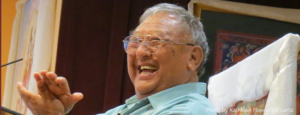I once received a telephone call from Allen Ginsberg, who was visiting William Burroughs at the time. Burroughs was worried that his addiction to drugs was going to be a problem at the time of death. My reply was that it was a physical addiction, not a mental addiction like anger. Your anger will bother you much more in your future life and at the time of death than any physical problem. The mind goes with you; the body stays.
When you look at your mind, what do you see? You probably see nothing. The mind itself is not tangible. It has no shape, no color. It is in reality like a crystal-clear lamp shade, and by nature, it is pure. When we encounter that natural mind, it is a good, relaxed feeling.
But mental faculties—such as anger, attachment, faith, love, and so on—change things. They pop up in our mind, suddenly, with or without reason. If you get irritated, anger pops up, and the moment it does, it’s as though the clear bulb under the lamp shade had been changed to a red one. The lamp shade now looks like a red lamp shade. If you remove the red bulb and put a blue one in, the lamp shade will turn blue. But if you look more closely, you’ll see that the color is coming from the bulb. That is exactly what happens to the mind under the influence of emotions. When a mental faculty such as anger pops up, suddenly the clean, clear mind becomes red or blue or green. The clarity is gone, and our transparent mind has now become a disturbed mind.
Positive mental faculties can also pop up. Their effect on the mind is to make it become more pure, more clean, more sincere, and they can become a habit. Changing our lightbulbs to positive ones means making an effort. We need the will or intention to do so. It’s like swimming against the current. It’s a struggle. But take action; go against the current, because the effort will pay off.
~ Gelek Rimpoche from “Good Life, Good Death: One of the Last Reincarnated Lamas to Be Educated in Tibet Shares Hard-Won Wisdom on Life, Death, and What Comes After”


